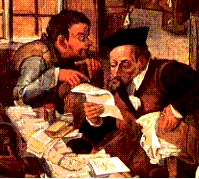Censorship
As early as 1559--five years before Shakespeare was born--Elizabeth proclaimed that no play should be performed that dealt with "either matters of religion or of the governance of the estate of the common weal." Thus censorship was concerned with profanity, heresy, and politics.
During Shakespeare's career, his company had to get a licence* from the Master of the Revels to perform, or to print plays.
One of the most striking examples of censorship in his plays was the forced omission from the first edition of Richard II of the whole scene of the deposition of Richard --it made rebellion seem too respectable.
The illustration here is of a tax collector rather than a censor, but the atmosphere of the two offices may be imagined to be similar.
An Act to restrain abuses of players
In 1606 (the year of Macbeth) an Act of Parliament was passed,
. . . That if any time. . . any person or persons do or shall in any stage play, interlude, show, maygame, or pageant jestingly or profanely speak or use the holy name of God or of Christ Jesus, or of the Holy Ghost or of the Trinity, which are not to be spoken but with fear and reverence, shall forfeit for every offence by him or them committed, ten pounds.
The result of this edict was that many plays had to be revised; the two printed versions of Marlowe's Doctor Faustus, one printed in 1603, the other (and fuller text) in 1608, show several changes as a result of the Act. Likewise there are a number of changes between quartos of Shakespeare's plays, printed before 1606, and the Folio text, printed in 1623.
Footnotes
-
Fighting over the stage
The City of London, controlled by puritan aldermen, had tried to prevent altogether the performance of plays, both in the city and the suburbs; it was actually to protect the players that Elizabeth gave the authority of censorship to the Master of the Revels in 1581.
